|
|
|
Sort Order |
|
|
|
Items / Page
|
|
|
|
|
|
|
| Srl | Item |
| 1 |
ID:
120692
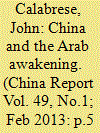

|
|
|
|
|
| Publication |
2013.
|
| Summary/Abstract |
The popular unrest that has swept the Arab World since January 2011-occurring as China entered a period of leadership succession and delicate economic adjustment-presented Beijing with both domestic political and diplomatic challenges. This article examines how, and how well, China responded to the Arab Awakening at home and in the conduct of its diplomacy.
|
|
|
|
|
|
|
|
|
|
|
|
|
|
|
|
| 2 |
ID:
120699
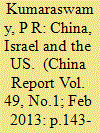

|
|
|
|
|
| Publication |
2013.
|
| Summary/Abstract |
Since the normalisation of relations in January 1992, Israel has been unable to pursue its military relations with China as before. This was primarily due to American pressures and its perception of China as its new strategic threat. Given its limited political options, arms sales and other forms of security assistance function as Israel's principal instrument of promoting its foreign policy interests. The weakening of American economic power and hence political influence, emergence of China as the second-largest economy in the world and China's growing strategic relations with the Middle East is likely to result in Israel re-examining its no-arms policy towards China.
|
|
|
|
|
|
|
|
|
|
|
|
|
|
|
|
| 3 |
ID:
120700
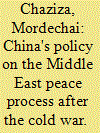

|
|
|
|
|
| Publication |
2013.
|
| Summary/Abstract |
This article focuses on China's policy towards the peace process in the Middle East after the end of the Cold War and the American influence on Chinese policy. China has always charted its policy on the Arab-Israeli peace process to be 'balanced diplomacy', maintaining friendly relations with Arab countries, while not neglecting its relationship with Israel. Furthermore, China's policy regarding the Israeli-Arab peace process contains contradictory elements in its dual relations with the 'peace camp' and the 'radical camp' in the Middle East. Chinese diplomacy finds itself in a complex dilemma, balancing the perils and prospects of its economic and strategic goals in the Middle East and the international arena. As a permanent member of the UN Security Council, China states that it shares the great burden of ensuring that the Middle Eastern peace process is managed correctly. However, its declaration is merely diplomatic rhetoric; Beijing does not actively endeavour to advance the peace process but is mainly interested in promoting its own economic interests and balancing the US hegemony in the region. Therefore, its approach is chiefly one of conflict management, rather than conflict resolution. Paradoxically, by trying to maintain good economic relations with everyone, it helps strengthen forces opposed to peace, such as Iran and Hamas.
|
|
|
|
|
|
|
|
|
|
|
|
|
|
|
|
| 4 |
ID:
120695


|
|
|
|
|
| Publication |
2013.
|
| Summary/Abstract |
China views Iran as an important country sharing many interests and views with China, and with whom China may benefit via cooperation in a wide number of areas. China views Iran as an especially reliable oil supplier in the event of a crisis in Sino-American relations, and as a capable and ambitious country defending itself against American aggressiveness. Yet Beijing also views maintaining comity in relations with the United States as vital to the success of China's long-term development drive. Beijing eschews open challenge to the US over Iran as potentially undermining Sino-US comity precisely because the US drive against Iran is so strategically important to what China views as a US drive to secure control of Persian Gulf oil. Beijing also views cooperation with Washington in the area of nuclear non-proliferation, and thus the Iran nuclear issue, as a factor stabilising Sino-US relations. China's ties with Iran thus vacillate between cooperation with Iran that often flies in the face of US efforts to sanction Iran, and cooperation with Washington to pressure Tehran over its nuclear programmes.
|
|
|
|
|
|
|
|
|
|
|
|
|
|
|
|
| 5 |
ID:
120696
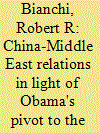

|
|
|
|
|
| Publication |
2013.
|
| Summary/Abstract |
As the United States perceives the westward expansion of China's influence as threatening both regional and worldwide balances of power, it has responded with an understandable but ill-conceived counter-action-the 'Obama pivot' from the Middle East to the Western Pacific. The new American thinking aims to divide the intercontinental and transoceanic regions that China and other nations want to integrate, while encouraging an 'encircle China' coalition among smaller maritime powers from India and Singapore to Australia and Vietnam and on to the Philippines, Japan and South Korea. The blind spot in the American plan is that all of these countries need China more than they need the United States. None of them wants a military alliance with Washington that will antagonise Beijing because their economic futures pull them inexorably towards greater integration with the mainland's vast and growing markets. Obama's eastward focus attempts to stem the powerful current of Islamic countries that have strengthened ties with China while quarrelling with the United States. A growing number of former American allies, including some that were virtual American dependencies, are now hedging their bets with more independent foreign policies that actively court Chinese investment, trade, military cooperation and diplomatic support.
|
|
|
|
|
|
|
|
|
|
|
|
|
|
|
|
| 6 |
ID:
120694


|
|
|
|
|
| Publication |
2013.
|
| Summary/Abstract |
China is the largest consumer of energy, the leading exporter of manufactured goods and possesses the second largest economy in the world. The great dragon's current economic activity extends to all corners of the world, including the hydrocarbon-rich Middle East. Since becoming a net importer of oil in 1993, China's engagement of the Middle East has focused heavily on energy acquisition as the country urgently needs reliable sources of oil and natural gas to continue its unprecedented economic rise. For now, Middle Eastern countries seem amenable to the nesting dragon, whose increasing energy consumption, rapidly expanding economy, lack of colonial history and a policy of 'offend no one', its vast cash reserves and a willingness to pay premium prices for energy sources render it a highly appealing partner, capable of balancing the hegemonic policies and unipolar presence of the US. This article provides a summary of China's expanding energy relations with seven major energy producing states of the Middle East, namely Saudi Arabia, Iran, Iraq, Kuwait, Oman, UAE and Qatar, and assesses the political implications of China's burgeoning relationship with the region.
|
|
|
|
|
|
|
|
|
|
|
|
|
|
|
|
| 7 |
ID:
120693


|
|
|
|
|
| Publication |
2013.
|
| Summary/Abstract |
China's 'non-interference' policy is not a new phenomenon. It originates in pre-modern Chinese history when the Empire had been isolated from the rest of the world, as well as in the Mao era when the Chinese-even if they had the will to interfere-did not have the capabilities. Post-Mao and post-Cold War, China has the capabilities but not yet the will to become more involved. Still, economic prosperity and growing political prominence have forced Beijing to compromise. Fundamentally, China's first option remains 'non-interference' and settling of conflicts by the parties concerned. Yet if this fails, then the Chinese prefer an intervention by a regional or professional organisation. If this attempt too, fails, then, reluctantly, Beijing turns to the United Nations Security Council as an option. The worst option is external and independent intervention. All these options are evident in China's Middle East policy.
|
|
|
|
|
|
|
|
|
|
|
|
|
|
|
|
| 8 |
ID:
120698
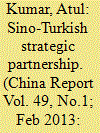

|
|
|
|
|
| Publication |
2013.
|
| Summary/Abstract |
The accelerated growth of Sino-Turkish relations indicates their increasing convergence on foreign, economic and security policies, despite several constraints. The deterioration of Turco-American relationship and frustrated Turkish ambitions of EU membership, coupled with a desire to diversify its arms acquisitions and balance its foreign policy, have led to the readjustments in its foreign and security policy. This realignment has resulted in closer Sino-Turkish partnership and emergence of the strategic cooperation. In China, a growing realisation has emerged in favour of Turkey's geo-strategic and geopolitical importance and its potential as a market for Chinese defence exports. Turkey as a client may impart much sought after international credibility to Chinese weapon manufacturers and a base in Turkey would enhance Chinese access to regional markets. Hence, China has increasingly courted Turkey and Chinese companies have increased their operations inside Turkey. In addition, there are significant convergences between both armed forces on issues of national security, separatism and terrorism. Consequently, strategic cooperation between China and Turkey has increased considerably in the last decade.
|
|
|
|
|
|
|
|
|
|
|
|
|
|
|
|
| 9 |
ID:
120697


|
|
|
|
|
| Publication |
2013.
|
| Summary/Abstract |
Over the past decade, China's relationship with Iran has been half-hearted. What has publicly been regarded as a close bilateral entente is in fact based on Tehran's lack of better options and China's clear ambition that a non-nuclear Iran should not be economically destabilised. The withdrawal of Chinese companies from technology transfers to Iran and the improvement of China's export controls have led to frustration on the Iranian side and set bounds to bilateral relations for the long term. Today, China tries to convey its disagreement with Iran's nuclear weapons program. At the same time, China has tried to separate the nuclear issue from civilian perspectives and opposed sanctions that might lastingly cripple Iran's economy. The reasons can be found in China's strategic regional considerations and interests in stability both inside and outside Iran. Thus, China has become a diplomatic broker whose credentials only suffer by the shortcomings of its own export control regime.
|
|
|
|
|
|
|
|
|
|
|
|
|
|
|
|
|
|
|
|
|